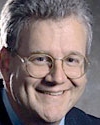|
Geoffrey Moore is most famous as the author of "Crossing the Chasm."
|
I really enjoyed listening to Geoffrey Moore's talk on Orchestrating the Stack from Software 2004. I would have enjoyed it even more, however, if I'd discovered his slides online beforehand since there's a lot that he references in them that doesn't come across well with just the audio alone.
The subtitle of Moore's talk is "Next generation developments in enterprise computing," but I was as much interested in what he considered the review before the real talk began. Apparently, he's been talking for some time about "systems of record" and I missed it. I thought it was an interesting analysis of the enterprise computing space and one that would give CIOs some insight into the enterprise computing software space.
Moore calls out ERP (enterprise resource planning) as the quintessential system of record. A system of record has four criteria:
- Scope - Manages a fundamental element of business data across the entire enterprise.
- Clout - Owned and sponsored by a CXO
- Value - Directly impacts core economics of the business.
- Inertia - Fed by high-volume, mission-critical transactions
By these criteria, ERP is a system of record since it manages financial data across the entire enterprise, is owned and sponsored by the CFO, provides value int he way of compliance, control, and operational integration, and has an anchor transaction in the form of updates to the general ledger.
Moore asks, "what other systems of record might there be?" He comes up with three:
- CRM - the customer system of record
- SCM - the supplier system of record
- PLM - the product system of record
Considered, but voted out was the ERM or employee resource management system. Given the critical nature of hiring, training, and retaining employees in some industries (I'm thinking about call-centers, for example) and its very real impact on the bottom line, I might argue with him on the last one. In fact, I think that you could question SCM, PLM, or ERM depending on the industry. Again, to use call centers as an example, an SCM system is not all that critical.
But, as I said, that wasn't really the point of this talk, that was just the prelude. The real point was that the application layer is not the only location for the system of record and that the underlying architecture of enterprise computing is shifting. He talks about SOA's for example. He believes that what he calls "orchestrating the stack" is where the action will be in the coming decade.
Abstractly, this stack consists of three layers, each of which have many components: the business layer, the computer processes, and the compute engines.
Moore says that the current stack represents an Internet-enabled client-server architecture. The next generation stack will be anchored in services-oriented He believes that this opens the window for new systems of record.
The talk goes on to give different strategies for "gorillas," those who own various pieces of the stack now, and "disrupters," those interested in displacing them. This is the part of the talk where you'll want to have both the slides and the audio available since the audio doesn't make much sense without the slides and they don't make much sense without the it. Well worth the time and effort.





